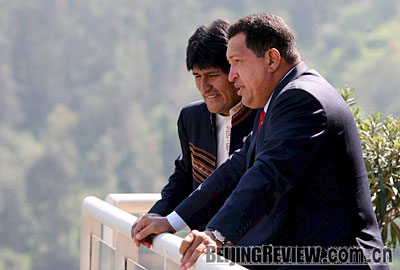| 
MUCH ALIGNED: Bolivian President Evo Morales (left) with Venezuelan President Hugo Chavez at an emergency summit of the Union of South American Nations in Santiago, Chile, on September 15 (CFP)
During his presidential campaign, Evo Morales said his election would be a "nightmare" for the United States. The Bolivian president honored his words.
On September 10, Morales declared U.S. Ambassador Philip Goldberg "persona non grata" and asked him to leave the country after Goldberg met with a Bolivian governor whose province is seeking autonomy. The United States expelled Bolivian Ambassador Gustavo Guzman the next day in retaliation.
Surprisingly, on the same day, Venezuelan President Hugo Chavez ordered U.S. Ambassador Patrick Duddy to leave within 72 hours. He supports Morales and the Bolivian people in their struggle to maintain territorial integrity, Chavez said.
Double standards
The United States always applies double standards to Latin American governments. It protects pro-U.S. Latin American governments even if their leaders are autocratic and unpopular with the public. For example, Anastasio Somoza Debayle, who ruled Nicaragua for 20 years from 1936 to 1956, was a genuine dictator. Nevertheless, the United States maintained close relations with the Somoza regime in order to build an alliance against the Soviet Union and communism in Central America, turning a blind eye to its dictatorial rule.
At the same time, the United States goes out of its way to topple hostile governments. After taking office in 1951, Guatemalan President Jacobo Arbenz Guzman initiated a land reform program, under which the government confiscated uncultivated land owned by the U.S.-based United Fruit Company. In June 1954, U.S. President Dwight D. Eisenhower authorized the Central Intelligence Agency to cooperate with Guatemala's armed forces in a coup d'etat that overthrew the Arbenz regime.
Salvador Allende, who became Chilean president in 1970, harmed U.S. economic interests in Chile as he tried to restrict foreign capital. In an effort to overthrow the Allende regime, the United States provided economic assistance to Chile's opposition and assisted General Augusto Pinochet in the military coup against Allende on September 11, 1973.
In the late 1980s, de facto Panamanian leader Manuel Antonio Noriega refused to conduct negotiations with the United States to revise the new Panama Canal Treaty and exposed U.S. violations of the treaty. The United States invaded Panama on December 20, 1989, capturing Noriega and bringing him to court in the United States.
Morales, elected in December 2005, is the first indigenous president of Bolivia. The United States has demanded that Bolivia and other Andean countries prohibit the growth of coca, the raw material for cocaine. Morales, however, has called for legalizing coca production. He has also taken a series of measures to restrict foreign capital. As a result, the United States considers Morales a thorn in its side.
Bolivia's domestic turmoil presents a good opportunity for the United States to topple the Morales regime. Economic development between eastern and western parts of Bolivia is highly unbalanced. Morales has called on the Central Government to take control of regional treasuries and transfer resources from the relatively rich east to the west. In response, some eastern departments have held referendums on autonomy. Morales declared the referendums illegal, causing spiraling conflicts between the Central Government and the eastern departments seeking autonomy.
The United States secretly supports the separatist activities in east Bolivia. In early September, amid mounting anti-government protests, Goldberg met with Ruben Costas, Governor of the pro-autonomy Santa Cruz Department and a staunch Morales opponent. "[Goldberg] is conspiring against democracy and seeking the division of Bolivia," Morales said when he announced the expulsion. The U.S. State Department called the allegations "baseless."
| 